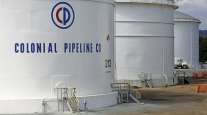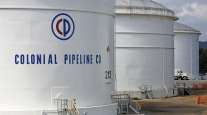Bloomberg News
Some Gas Pumps Run Dry Due to Panic Buying

[Stay on top of transportation news: Get TTNews in your inbox.]
Motorists across a broad swath of the East Coast and South are struggling to find gasoline and diesel as filling stations run dry amid the unprecedented pipeline disruption caused by a criminal hack.
From Virginia to Louisiana, convenience stores and corner gas stations are turning away customers as tanks tap out amid panic buying. The White House relaxed some environmental rules in a bid to allow gasoline to flow in from other parts of the country.
One Washington, D.C.-area fuel distributor warned that “catastrophic” shortages are imminent and called on government officials to order school buses to stay off the roads. Four days into the crisis, Colonial Pipeline Co. has only managed to restart a small segment of the pipeline as a stopgap measure and doesn’t expect to be able to substantially restore service before the weekend.
Beyond that, Colonial has said very little about its next steps, leaving oil refiners and distributors in the dark about what may happen over the next 48 hours. Companies that rely on the pipeline are increasingly frustrated about the lack of transparency, according to a shipper who asked not to be named discussing commercial conversations.
IF YOU DO immediately need gas, the GasBuddy Fuel Availability Tracker has been turned on in the following states: GA, AL, TN, SC, NC, FL, VA and MD. In the app you will be able to see which stations near you are out of fuel, and which still have supply. https://t.co/SpQg6ukh6z — GasBuddy (@GasBuddy) May 11, 2021
“We have been providing daily and sometimes twice-daily updates to our shippers, and have been in close contact with law enforcement and federal agencies to relay information on our restoration efforts,” Colonial’s media relations office said in an email. “We will continue to keep all of our stakeholders informed and appreciate the outpouring of support we have received throughout the industry.”
U.S. average retail gasoline prices have risen to their highest since late 2014 due to the disruption, almost touching $3 a gallon. That could add to broader inflationary pressures as commodity prices from timber to copper also surge.
Two of the nation’s largest truck-stop owners — Love’s Travel Stops & Country Stores Inc. and TravelCenters of America Inc. — confirmed that fuel is scarce is some states. Both companies said they’re taking extraordinary measures to replenish tanks.
Federal transportation regulators took the first step toward waiving rules that prohibit foreign-flagged and -staffed ships from hauling products from one U.S. port to another. Virginia followed North Carolina in declaring a state of emergency.
“It’s going to be catastrophic,” said John Patrick, chief operating officer of Liberty Petroleum Corp. “Governors should declare a state of emergency and ask people chasing tanker trucks to gas stations to stay home. School buses stay put.”
Gasoline isn’t the only oil-derived product under threat. In an effort to bolster jet-fuel inventories, Southwest Airlines Co. has begun flying supplies to Nashville, Tenn., and other cities. So far, no Southwest flights have been affected by the pipeline closure; rather the airline said it’s “actively managing” fuel stockpiles.
The Colonial pipeline is the most important conduit for distributing gasoline, diesel and jet fuel in the U.S., connecting refineries along the Gulf Coast to population centers from Atlanta to New York and beyond. Each day, it ships about 2.5 million barrels (105 million gallons), an amount that exceeds the entire oil consumption of Germany.
Five Hours in Line
RaceTrac Petroleum Inc. warned motorists that some of its filling stations across the South are out of fuel as a result of the Colonial Pipeline Co. hack.
The shortages are impacting retail outlets in Louisiana, Georgia, Tennessee and Alabama, RaceTrac spokeswoman Megan Shannon said in an email. Fuel outages are spreading from Florida to North Carolina as the shutdown of Colonial’s daily deliveries drags into a fourth day.
In Virginia and Maryland near Washington, D.C., drivers are waiting as much as five hours to fill up their tanks and some motorists are topping off even when its three-quarters full, Liberty's Patrick said in an email.
In Asheville, N.C., Aubrey Clements, a clerk at an Exxon Mobil Corp. station, answered the phone with “Hello, I’m currently out of gas.” The Marathon gas station in Elizabethtown had roughly two dozen cars waiting to fuel up, an employee said.
Lines to get to the gas pumps forming all across the Upstate tonight. Experts say people should not overwhelm the system as we see “wait lines” well past 11pm @foxcarolinanews #CyberAttack #gasshortage pic.twitter.com/RHY9s7qDoH — Shale Remien (@ShaleRemien) May 11, 2021
Drivers pulling into a station with a sign offering unleaded gasoline for $2.649 per gallon in Manning, S.C., were met with pumps covered in yellow and red “out of service” bags. An estimated 7% of gas stations in the state of Virginia were out of fuel as of late May 10, according to GasBuddy analyst Patrick DeHaan.
Without the Colonial system, many cities and airports are forced to seek alternative supplies imported by tanker ships, barges or trucks. Even when the pipeline is restored to full service, it’ll take about two weeks for gasoline stored in Houston to reach East Coast filling stations, according to the most recent schedule sent to shippers.
For diesel and jet fuel, the transit time is even longer — about 19 days — because they are heavier and move more slowly.
Dwindling Supplies
Federal environmental regulators are waiving rules that bar the sale of conventional gasoline in areas where reformulated fuel is required. They also will permit the sale of gasoline that doesn’t satisfy requirements meant to help combat smog. The waivers apply to Maryland, Virginia, Pennsylvania and Washington, D.C., through May 18.
In New Jersey, closely held Bolkema Fuel Company began topping off its stockpiles as soon as word spread of the Colonial outage.
“There is a panic going out, you know, when you hear something like this,” said Vice President John Bolkema. “I called in an extra driver and said, just run a few extra loads. Let’s pump up the inventory and wait this out.”
His supplier increased prices at least three times on May 10 as other businesses sought to stock up, and Bolkema’s commercial clients are asking for extra deliveries to avoid running low.
Colonial CEO Joe Blount and a top lieutenant assured Deputy Energy Secretary David Turk and state-level officials on May 10 that the company has complete operational control of the pipeline and won’t restart shipments until the ransomware has been neutralized.
— With assistance from Gerson Freitas Jr., Sheela Tobben, Lucia Kassai, Jennifer A. Dlouhy, Mary Schlangenstein and Jill R. Shah.
Want more news? Listen to today's daily briefing below or go here for more info:



